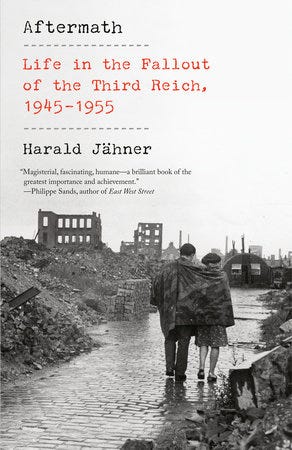The book traces the flow of events in Germany after they lost the Second World War. The Allies won! They were celebrating in the streets of London and New York but what about Berlin? What was happening there?
The book is based on testimonies of people and literature from the time of individuals and newspapers that have been preserved in various forms.
Normally, when a country loses, the victors march in and take over the land. They start exploiting it. Germany was left in limbo. The powers that be were busy negotiating the terms of surrender.
There was an overwhelming sense of relief in Germany. People were in fact happy that the war had ended, no matter the outcome.
As the last shot had been fired, the greatest challenge that most Germans faced was reconciling with the fact that they were complicit with Hitler. By allowing this regime to flourish, they had allowed the atrocities and the war to visit them. They were just as guilty of the concentration camps as Hitler was. 9 million Germans were registered card-carrying members of the Nazi party. What of them?
The years immediately after the end of the war were spent forgetting what had been done to the Jews. To deny that they had any role to play in the atrocities of the regime, if not to others, to themselves.
No sooner had they realised that the war had ended, they were left to deal with the ruins across the country. There were few cities that could be navigated even to get milk across to people. Incredibly the supply chain never stopped. Food kept making its way to the people. Nobody starved to death! Dairy and farm goods continued to be supplied to the cities.
What happens when men make a mess? Women are left to clean it up. Women across Germany were engaged in cleaning up the rubble. Called Trümmenfrau, they took on the responsibility of clearing the estimated 500 million cubic metres of rubble or enough to build 150 Pyramids of Giza. In a matter of weeks, it was possible to drive through most German towns.
The rubble also attracted tourists, who wanted to see first-hand how badly the cities had been destroyed. Rubble Tourism from across Europe boomed.
The people who were freed from concentration camps had no home to go to. They did not belong to any place. They were just left to wander the country to find a place that they could then belong to. They had no hopes of finding a home. They got out of the fire and into the frying pan. They had to rebuild their entire lives all over again. Many chose to escape from Germany, either to other European nations or to the US. Britain had by this time refused to accept Jewish refugees.
The Germans who had gone to war as soldiers were left with nothing to come back to. They had to not only contend with the loss but also the loss of self-esteem as they returned back as vanquished. Many of them did not even return to Germany immediately, rather choosing to wander the lands where they were sent to fight. Returning home, they found that their wives had become far more resourceful than what they had left. On the other hand, the men were far less useful.
As the rubble cleared out and the supply chain started to resume across Germany, restaurants and bars opened across the country and there was a dancing frenzy in the nation. For years, they had been at war and they now needed to let loose. The women especially those who were at the receiving end of the war in Germany, took to partying hard.
Since many men had died on the battlefield, there were not enough men for the women in Germany. They would go out each night to dance and meet men. They just wanted companionship, and some sex, they wanted to live their lives without any restraint. Bar owners would hire men who would draw women into the pubs and get them started on a drink or two and then move on to bring the next woman into the pub.
While a lot of consensual sex took place in West Germany, especially with the allied military men who were still in the country. The American soldiers had been told not to mix with the German women for security reasons. When that did not work, they were told to be careful in order to avoid Venereal Diseases (VD). This became a running joke amongst the soldiers who invented a euphemism to describe German women - Veronica Dankeschön.
Almost everything in Germany had to be either smuggled in or traded for. Food could only be bought through ration. Food tickets were issued that were limited by the person. Therefore, food ration tickets were also traded. Most of the trading was done with American soldiers who got their regular supply of cigarettes and liquor from America.
It was a time of great tumult and order was not restored till currency reforms took place. Prior to that a lot of barter took place.
This book goes into a lot of detail about this tumultuous time and makes for a fascinating read.



